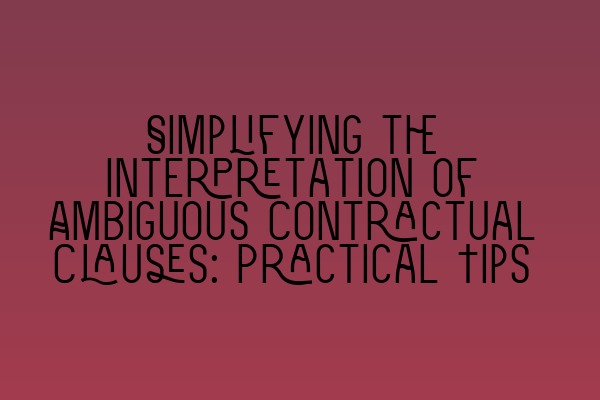Simplifying the Interpretation of Ambiguous Contractual Clauses: Practical Tips
Welcome to SQE Contract Law’s blog post, where we aim to simplify complex legal concepts for our readers. In this article, we will provide you with practical tips on how to interpret and understand ambiguous contractual clauses. Whether you are a practitioner, entrepreneur, or student, these tips will help you navigate the complexities of contract law with ease.
Before we dive into the practical tips, let’s first understand the significance of interpreting contractual clauses correctly. Ambiguity in contract clauses can lead to disputes, costly litigation, and damaged business relationships. Therefore, it is crucial to have a clear understanding of how to interpret these clauses to ensure both parties are on the same page.
Tip 1: Start with the Plain Meaning
When faced with an ambiguous clause, always start with the plain meaning of the words used. Look at the clause’s literal interpretation and consider what it would mean to a reasonable person without any additional context. This will provide you with a solid foundation for understanding the clause.
However, keep in mind that the plain meaning may not always be clear or all-encompassing. In such cases, you need to delve deeper and consider other factors.
Tip 2: Analyze the Contract as a Whole
Contracts are holistic documents, and no clause should be interpreted in isolation. To truly understand the intention of the parties, you must consider the entire contract’s context and purpose. Look for any references within the contract that may shed light on the clause in question.
Additionally, consider the relationship between the parties, the industry standards, and any relevant legal principles. Understanding the bigger picture will help you interpret the ambiguous clause accurately.
If you are interested in learning more about interpreting contractual clauses, check out our article “Interpreting Contractual Clauses: Unlocking the Hidden Meanings.” It provides a comprehensive guide to interpreting various types of contractual clauses.
Tip 3: Seek External Evidence
If you are still unable to resolve the ambiguity after analyzing the contract as a whole, it may be necessary to seek external evidence. This can include evidence of the parties’ conduct before, during, or after the contract negotiations. It can also involve examining industry customs or trade practices.
However, keep in mind that seeking external evidence should be a last resort, as it may introduce additional complexities and increase the chances of disputes. Hence, it is important to exhaust all other avenues of interpretation before relying on external evidence.
Tip 4: Consider the Principle of Contra Proferentem
When all else fails, and the ambiguity remains unresolved, resort to the principle of contra proferentem. This Latin term translates to “against the offeror,” and it means that any ambiguity in a contract should be interpreted against the party who drafted the contract.
This principle aims to protect the party who did not have the opportunity to draft or negotiate the clauses. By interpreting the ambiguity against the offeror, it encourages clear and unambiguous drafting.
To gain a deeper understanding of the legal aspects of business contracts, entrepreneurs should explore our article “Legal Aspects of Business Contracts: Key Considerations for Entrepreneurs.” It provides valuable insights into drafting and negotiating contracts to protect your business interests.
Tip 5: Seek Professional Advice
While these practical tips can help you simplify the interpretation of ambiguous contractual clauses, it is important to remember that every contract is unique. In complex situations, it is always wise to consult a skilled contract law solicitor who can provide tailored advice based on your specific circumstances.
If you are a student looking for simplified explanations of complex contract law concepts, we recommend checking out our series of articles titled “Contract Law Tutorials: Simplifying Complex Concepts for Students.” These articles break down complex concepts into digestible explanations, making it easier for students to grasp and apply them.
In Summary
Interpreting ambiguous contractual clauses is an essential skill in contract law. By starting with the plain meaning, analyzing the contract as a whole, seeking external evidence as a last resort, considering the principle of contra proferentem, and seeking professional advice when needed, you can simplify the interpretation process and avoid costly disputes.
Remember, a clear and unambiguous contract leads to smoother business relationships and reduces the risk of misunderstandings. Invest time and effort into understanding and interpreting contractual clauses correctly to protect your interests and foster successful business dealings.
